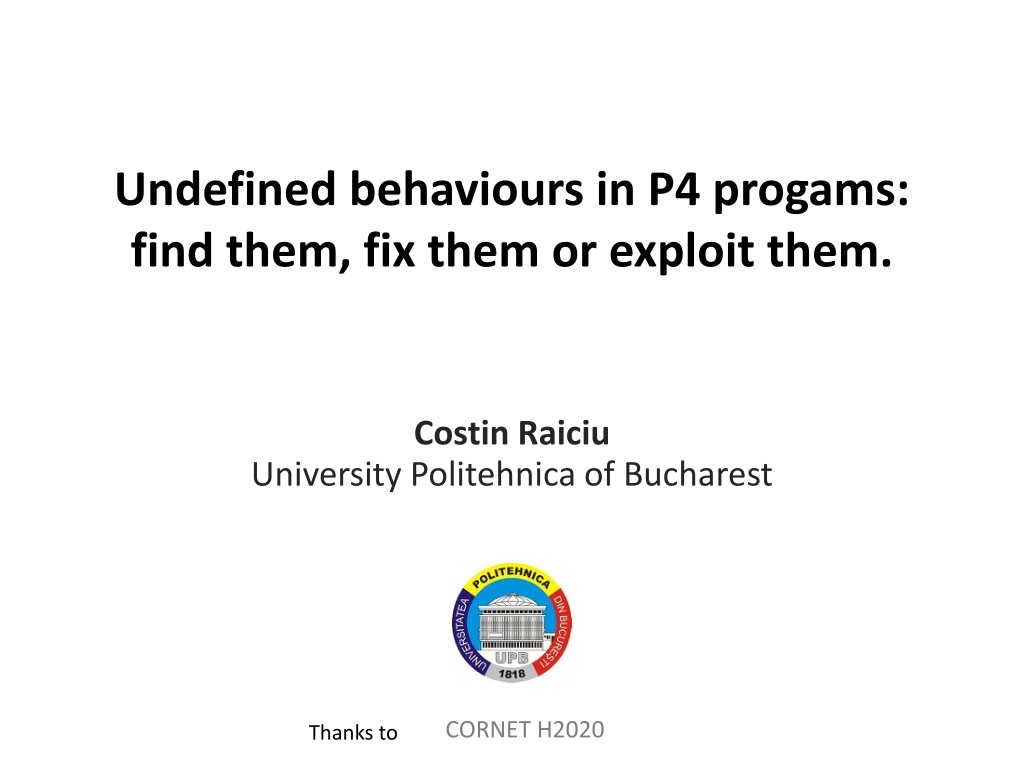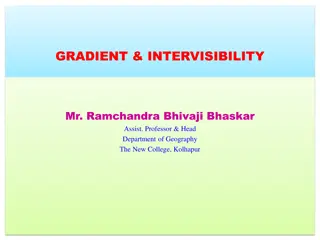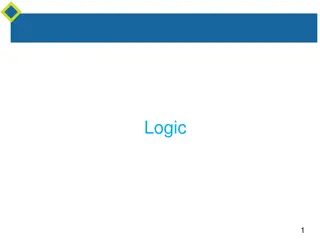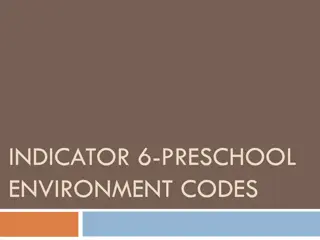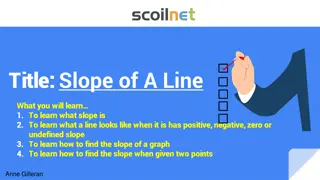Understanding Undefined Behaviours in P4 Programs
Explore the implications of undefined behaviours in P4 programs, discover how to identify and address them, or even leverage them to your advantage. Delve into the world of P4 programming, where you can manipulate packet processing sequences, match-action tables, and packet transformations within a P4 switch environment.
Uploaded on Sep 24, 2024 | 0 Views
Download Presentation

Please find below an Image/Link to download the presentation.
The content on the website is provided AS IS for your information and personal use only. It may not be sold, licensed, or shared on other websites without obtaining consent from the author. Download presentation by click this link. If you encounter any issues during the download, it is possible that the publisher has removed the file from their server.
E N D
Presentation Transcript
Undefined behaviours in P4 progams: find them, fix them or exploit them. Costin Raiciu University Politehnica of Bucharest CORNET H2020 Thanks to
P4 by example: route and encapsulate Ingress Pipeline Egress Pipeline encap *1.2.3.4 5.6.7.8 IN DEPARSER PARSER Buffers OUT ipv4_lpm 10.0.0.0/8 Ge0 TTL>0 Control program what sequence of M/A tables is applied to a packet Match-action (M/A) tables - how a P4 switch can tranform packets What packets the switch accepts and outputs 2
P4 by example: route and encapsulate Ingress Pipeline Egress Pipeline encap *1.2.3.4 5.6.7.8 IN DEPARSER PARSER Buffers OUT ipv4_lpm 10.0.0.0/8 Ge0 TTL>0 parser start { extract(eth); return select(eth.type){ 0x800 : parse_ipv4; default: ingress; }} parser parse_ipv4 { extract(ipv4); return ingress; } Deparsing uses the same parser specification. Common problem: forget to parse output packets. 3
P4 by example: route and encapsulate Ingress Pipeline Egress Pipeline encap *1.2.3.4 5.6.7.8 IN DEPARSER PARSER Buffers OUT ipv4_lpm 10.0.0.0/8 Ge0 TTL>0 parser start { extract(eth); return select(eth.type){ 0x800 : parse_ipv4; default: ingress; }} parser parse_ipv4 { extract(ipv4); return select(ipv4.protocol){ 0x5E : parse_inner_ipv4; default: ingress; }} parser parse_inner_ipv4 { extract(inner_ipv4); return ingress; }} 4
P4 by example: route and encapsulate parser start { extract(eth); return select(eth.type){ 0x800 : parse_ipv4; Ingress Pipeline Egress Pipeline encap *1.2.3.4 5.6.7.8 default: ingress; }} parser parse_ipv4 { extract(ipv4); return select(ipv4.protocol){ 0x5E : parse_inner_ipv4; default: ingress; }} parser parse_inner_ipv4 { extract(inner_ipv4); return ingress; }} IN DEPARSER PARSER Buffers OUT ipv4_lpm 10.0.0.0/8 Ge0 TTL>0 control ingress(){ if (ipv4.TTL>0) } apply(ipv4_lpm); Reading unparsed header fields will return undefined values 5
P4 by example: route and encapsulate Ingress Pipeline valid(ipv4) &&TTL>0 Egress Pipeline encap *1.2.3.4 5.6.7.8 IN DEPARSER PARSER Buffers OUT ipv4_lpm 10.0.0.0/8 Ge0 control ingress(){ if (valid(ipv4) and ipv4.TTL>0) apply(ipv4_lpm); } Non IPv4 packets will be sent directly to buffering resulting in undefined behavior because the egress_spec is not set 6
P4 by example: route and encapsulate Ingress Pipeline valid(ipv4) &&TTL>0 Egress Pipeline encap *1.2.3.4 5.6.7.8 IN DEPARSER PARSER Buffers OUT ipv4_lpm 10.0.0.0/8 Ge0 Re-adding existing header fields: undefined behavior 7
Undefined behaviours in P4 Accessing invalid headers. Valid headers not deparsed. Reviving dropped packets. Out-of-bounds array accesses. Overflows / underflows. control ingress(){ if (ipv4.TTL>0) } apply(acl) //triggers action that drops packet apply(lpm) //triggers action that sets egress_spec to a valid value apply(ipv4_lpm); parser start { extract(eth); return select(eth.type){ 0x800 : parse_ipv4; default: ingress; }} parser parse_ipv4 { extract(ipv4); return ingress; } Infinite loops.
Architecture-specific behaviour Reparseability Live mutually exclusive headers (cf. parser) Ambiguous forwarding. Ingress pipeline parse egress pipeline ?
Undefined behaviour is bad. What happens on actual targets?
Test to find out Craft buggy programs Inject packets to trigger undefined behaviour Observe results on Tofino, P4NetFPGA,Bmv2 SimpleSwitch
Testing undefined header accesses src dst ethertype Faulty packet Good packet IPv4 Ethernet0x800 Ethernet0x809 control ingress() { if (!isValid(ipv4)) } Previous packets IPV4 checksum field apply(m); Bmv2 table m, default action copy copy (){ ether.etherType = ipv4.check; } P4NetFPGA etherType field set to 0. Tofino etherType field set to 0.
Testing undefined header accesses (2) src dst ethertype Faulty packet Good packet IPv4 Ethernet0x800 Explore Ethernet0x809 control ingress() { if (isValid(Explore)) apply(m) } Values from previous ipv4 headers. Bmv2 Table m default action copyALL copyAll(){ explore.srcAddr = ip.srcAddr; // explore.proto = 0x13 } Explore unchanged except for protofield P4NetFPGA Explore fields set to zero. Tofino
Writing invalid headers src dst ethertype Faulty packet Good packet IPv4 Ethernet0x800 Explore Ethernet0x809 if (isValid(explore){ ipv4.src= 0.0.0.0 // } if (ipv4.src==0.0.0.0) eth.etherType = 0x1 Bmv2 Writes and read succeed. P4NetFPGA Writes and read succeed. Tofino Writes and read succeed, explorechanged
Loops Write infinite loops using resubmit and clone egress to egress. Insert 1 packet to trigger each bug. P4NetFPGA Does not support recirculation. Tofino Clone egress-to-egress: DDoS on egress. Bmv2 +Resubmitted packets block ingress pipeline.
Resurrecting dropped packets mark_to_drop() set_egress_spec Tofino OK: drop sets flag,must be cleared on purpose to resurrect P4NetFPGA Drop sets egress_spec to 0 Bmv2 Drop sets egress spec to 511
Can we exploit P4 programs? Assume strongest possible attacker Directly connected to switch Knows both program and table rules.
Impossible attacks * Code injection Control flow hijacking Return oriented programming Possible attacks Data flow attacks Denial of service Privilege escalation
Some attacks we mounted SimpleNAT Bypass ACL with resurrected packets Denial of Service Privilege Escalation Switch Privilege Escalation
Good cop Finding P4 bugs before deployment
Verification value proposition Inspect P4 program before deployment. Flag (all) bugs to programmer. Ensure deployed programs are bug-free.
A growing number of verification tools for P4 p4-nod [MSR TR ] p4-pktgen [SOSR 2018] p4v [Sigcomm 2018] Vera [Sigcomm 2018] p4-assert [Conext 2018] af4 - ongoing work
A P4 program is only half a program Full functionality: P4 program + table rules Key decision: how to deal with missing rules: Concrete rules (commands.txt) Vera, p4pktgen. Burden on programmer to provide relevant snapshots; poor coverage, fast (seconds). Assume all rules possible, have programmer to provide control-plane annotations - p4v, p4-assert. Great coverage, burden on programmer to provide annotations, a bit slower (minutes). Derive control plane annotations automatically af4.
Verification approach 1. Translate P4-14 program to another language with clearer semantics, or use P4-16. GCL (p4v), SEFL (Symnet), C (p4-assert), P4-16 (p4-pktgen, af4) 2. Instrument code to add traps that detect bugs. 3. Find reachable bugs, report to programmer with example packets. Symbolic execution or verification condition generation
Vera [Sigcomm18] P4 table entries P4 program P4 to SEFL Compiler Implicit bug checks Symnet verification engine[Sigcomm 16] For each possible path: full instruction trace, header field values, constraints and, if needed, bug type 25
Generating all header layouts parser start { extract(eth); return select(eth.type){ 0x800 : parse_ipv4; default: ingress; }} parser parse_ipv4 { extract(ipv4); return select(ipv4.protocol){ 0x5E : parse_inner_ipv4; default: ingress; }} parser parse_inner_ipv4 { extract(inner_ipv4); return ingress; }} 26
Generating all header layouts parser start { extract(eth); return select(eth.type){ 0x800 : parse_ipv4; default: ingress; }} parser parse_ipv4 { extract(ipv4); return select(ipv4.protocol){ 0x5E : parse_inner_ipv4; default: ingress; }} parser parse_inner_ipv4 { extract(inner_ipv4); return ingress; }} Eth IPv4 Inner_IPv4 27
Generating all header layouts Eth Eth IPv4 Inner_IPv4 28
Generating all header layouts Eth Eth Eth IPv4 IPv4 Inner_IPv4 29
Generating all header layouts Eth Eth Eth IPv4 IPv4 Eth IPv4 Inner_IPv4 Inner_IPv4 30
Symbolic execution of P4 models Eth Eth IPv4 Eth IPv4 Inner_IPv4 31
Symbolic execution of P4 models Ethernet IPv4 Dst Src EtherType Src Dst TTL ... Eth IPv4 * * 0x800 * * * * 32
Symbolic execution of P4 models Ethernet IPv4 Dst Src EtherType Src Dst TTL ... Eth IPv4 * * 0x800 * * * * control ingress(){ if (ipv4.TTL>0) apply(lpm); } 33
Symbolic execution of P4 models P414 control ingress(){ if (ipv4.TTL>0) apply(lpm); } 34
Symbolic execution of P4 models P414 SEFL control ingress(){ if (ipv4.TTL>0) apply(lpm); } ingress : If(Constrain( ipv4.TTL >0)) Forward( table.lpm ) else Forward( buffer.in ) 35
Symbolic execution of P4 models SEFL ingress : If(Constrain( ipv4.TTL >0)) Forward( table.lpm ) else Forward( buffer.in ) Ethernet IPv4 Dst Src EtherType Src Dst TTL ... * * 0x800 * * * * 36
Symbolic execution of P4 models SEFL ingress : If(Constrain( ipv4.TTL >0)) Forward( table.lpm ) else Forward( buffer.in ) Ethernet IPv4 Dst Src EtherType Src Dst TTL ... * * 0x800 * * * * Dst Src Ether Type Dst Src Ether Type Dst TTL ... Src Dst TTL ... Src * * 0x800 ==0* * * 0x800 * * >0 * * * 37
Symbolic execution of P4 models SEFL ingress : If(Constrain( ipv4.TTL >0)) Forward( table.lpm ) else Forward( buffer.in ) Ethernet IPv4 Dst Src EtherType Src Dst TTL ... * * 0x800 * * * * Dst Src Ether Type Dst Src Ether Type Dst TTL ... Src Dst TTL ... Src * * 0x800 ==0* * * 0x800 * * >0 * * * 38 Apply LPM
Symbolic execution of P4 models SEFL ingress : If(Constrain( ipv4.TTL >0)) Forward( table.lpm ) else Forward( buffer.in ) Ethernet IPv4 Dst Src EtherType Src Dst TTL ... * * 0x800 * * * * Dst Src Ether Type Dst Src Ether Type Dst TTL ... Src Dst TTL ... Src * * 0x800 ==0* * * 0x800 * * >0 * * * 39 Goto buffer in
Vera works great for concrete table rules, but the rules are only known at runtime. Apply Vera at runtime, catching rules before they are inserted and re-check the entire program. Too slow! Assume all table entries are possible symbolic table entries Repeatedly finds same bugs, does not scale 41
p4v [Sigcomm 18] assume action(tunnel_decap) == decap_6in4 iff action(tunnel_term) == term_6in4 Control-plane interface FAILED counterexample P4 program GCL Program Z3 PASSED GCL (Annotated, Optimized) Verification condition
p4v evaluation switch.p4 ~ 2 minutes Control plane interface: 758LOC Found 10 bugs: 2 parser bugs, 4 action flaws, 3 infeasible control plane, 1 invalid table read.
p4v vs. Vera Catches fewer bug types, e.g. no loops. Covers all possible dataplanes Scales much better, but requires manual annotations 700 annotations for 6KLOC program
af4 annotation-free verification&repair Automatically infer annotations for table rules Backend for the p4c compiler (11KLOC) Inhibit many (ideally all) unsafe behaviours Do not prevent any safe behaviours No manual annotations required
Key idea Find table rules that always lead to faulty behaviour table nat { actions={ drop();//... nat_hit_int_to_ext(); } key = { //... hdr.ipv4.isValid(): exact hdr.ipv4.srcAddr : ternary} } isValid hdr.ipv4.srcAddr action 10.10.10.10, 255/8 GOAL: AUTOMATICALLY DERIVE PREDICATES TO FILTER BAD RULES 0 drop ALL PACKETS TRIGGER BUG 0 *, 255/8 * ALL PACKETS TRIGGER BUG 0 *, != 0 * ALL PACKETS TRIGGER BUG
af4 operation summary P4 Transform & instrument program
af4 operation summary Expand table calls Generate reachability conditions P4 Transform & instrument program
af4 operation summary Expand table calls Generate reachability conditions P4 Transform & instrument program SAT(reach(bug)) Find reachable bugs
